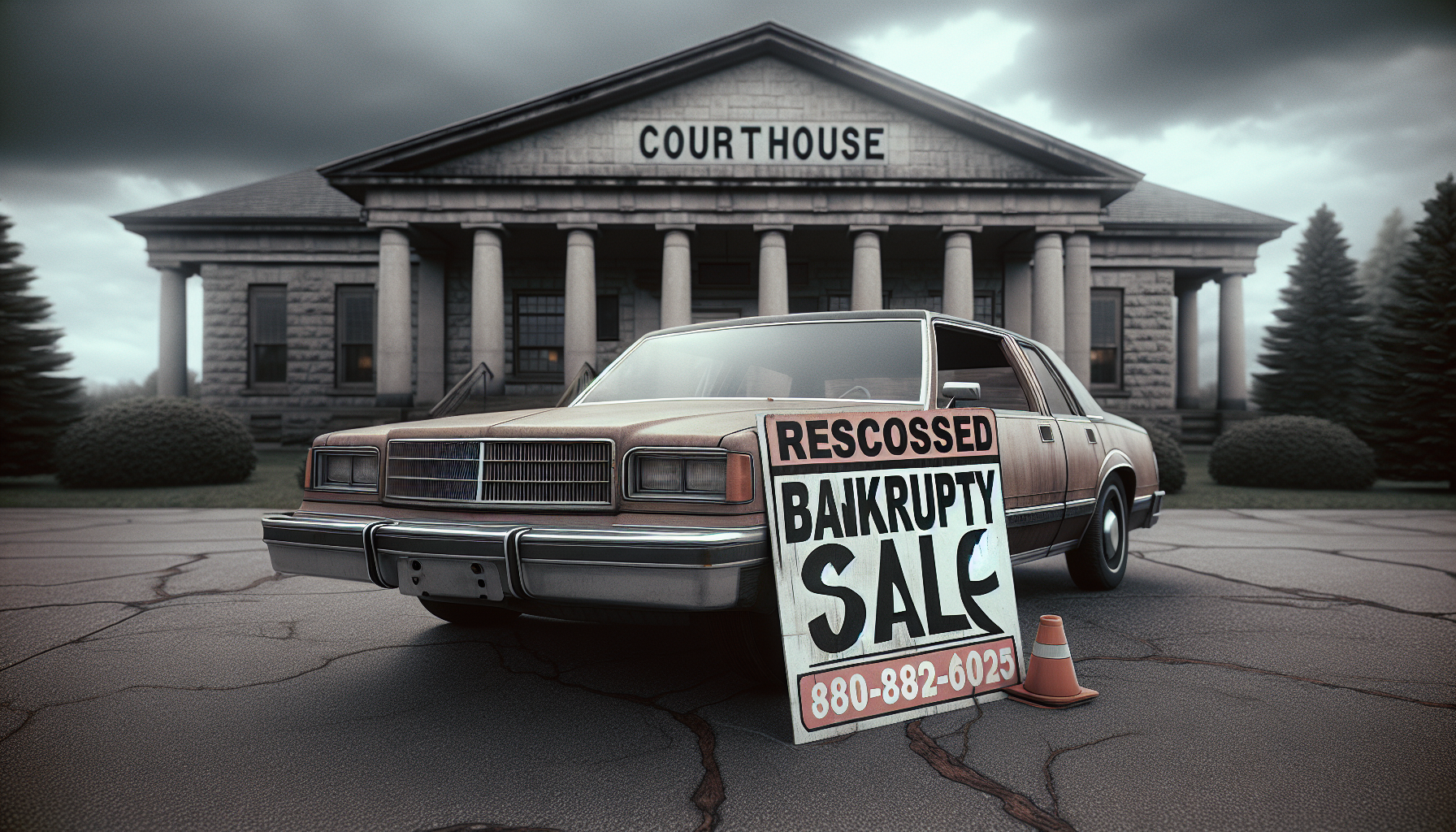
An Insolvency administrator, often recognized as a Bankruptcy Trustee, occupies a critical position in the realm of vehicle financing during Chapter 13 or Chapter 7 bankruptcy cases. As debtors grapple with severe financial challenges, the trustee carefully evaluates whether the car serves as an indispensable asset for employment or essential personal transportation.
In this capacity, they hold significant influence over asset liquidation choices or the formulation of reorganization strategies, playing a key role in repossession prevention initiatives.
Their oversight extends to auto loan debt relief strategies, where they engage in discussions with creditors aiming to achieve reductions in monthly payments or interest rates.
This negotiation is fundamental, as it may allow the debtor to retain their vehicle on more sustainable financial terms. Consequently, the trustee’s involvement as an insolvency administrator was crucial in managing the vehicle financing during the chapter 11 process, orchestrating asset liquidation, and implementing repossession prevention strategies to provide auto loan debt relief for the debtor.
“Learn more by clicking here:” file7file13.com
Understanding the Insolvency Administrators Role
As a crucial intermediary in creditor negotiations during personal financial turmoil, an Insolvency Administrator embodies an essential role within the intricacies of personal insolvency consequences. These specialized professionals navigate the complexities of financial law to serve debt-burdened individuals or corporations, striking a delicate balance between the needs and rights of both debtors and creditors.
When an automatic stay in bankruptcy takes effect, the administrator’s responsibilities are significantly heightened.
They become the custodians of stability, ensuring that assets, such as vehicles and real estate, are shielded from immediate liquidation or seizure.
Their expertise is particularly crucial in overseeing repayment plans under Chapter 13 or Chapter 11, where they formulate and supervise plans tailored to enable the debtor to clear their obligations over time while operating within the framework of the law. In instances involving secured debt restructuring, the Insolvency Administrator takes on the role of mediating creditor negotiations, managing the automatic stay in bankruptcy, structuring repayment plans under Chapter 13, and addressing personal insolvency consequences for the debtor.

Vehicle Financing Options During Chapter 13
When grappling with a car loan default, remedies may seem elusive; however, seeking a financial reorganization consultancy can open new pathways. In the challenging phase of bankruptcy, having a trustee-approved expenditures roster becomes indispensable, especially for essential vehicle financing options.
By critically reevaluating your circumstances, a savvy financial mediator might unveil legal debt discharge alternatives that permit managing your obligations while maintaining adherence to strict bankruptcy exemptions.
A review of your financial standing could preserve your ability to keep your current vehicle or facilitate the acquisition of an alternative mode of transport, always staying within the permitted legal debt discharge parameters.
Collaborating closely with a financial reorganization consultancy is particularly beneficial. Such experts ensure that any measures, such as procuring new loans or renegotiating existing ones, fall within the appropriate legal boundaries. It’s imperative to handle these proceedings under the watchful eye of a competent financial mediator, ensuring that car loan default remedies, legal debt discharge, financial reorganization consultancy, trustee-approved expenditures, and bankruptcy exemptions are all managed with the utmost diligence and adherence to legal standards.
| Financial Reorganization Benefits | Bankruptcy Management Essentials |
|---|---|
| Unveils legal debt discharge alternatives | Trustee-approved expenditures roster |
| Facilitates vehicle financing options | Adherence to strict bankruptcy exemptions |
| Preserves ability to retain or acquire vehicles | Ensures measures fall within legal boundaries |
Strategies for Asset Liquidation and Car Loans
In the midst of financial difficulties, especially those leading to insolvency, understanding the importance of credit repair and strategic asset liquidation is paramount. A critical step in this process is the ‘Means test for filing eligibility,’ which determines suitability for various debt relief solutions.
For individuals focused on mending their financial standing after insolvency, accurately assessing the collateral value of personal assets, particularly vehicles, is fundamental to achieving fiscal stability.
Working proactively with lenders insolvency rights to address your vehicle financing is a necessary task.
Being aware of your disclosure obligations in debt proceedings is the foundation of honest discussions about your financial predicament. This transparency can open doors to beneficial arrangements, such as refinancing the car loan or agreeing on alternative payment frameworks. Effective negotiation hinges on a precise collateral value assessment of your vehicle, as this figure is influential in deciding your ability to retain the car and navigate the means test for filing eligibility, reinforce your position during credit repair post-insolvency, acknowledge lenders’ insolvency rights, and meet disclosure obligations in debt proceedings.
How to Prevent Repossession of Your Vehicle
Facing financial difficulties, safeguarding your vehicle from repossession should be a top concern. It requires a grasp of the legalities surrounding this process, including the potential role of a court-appointed trustee who may oversee repossession procedures.
To prevent this outcome, you must act swiftly, implementing early intervention strategies that consist of recognizing warning signs and maintaining open dialogue with your lender—an approach that may lead to successful negotiations for loan modifications or options to refinance your auto loan.
Effective financial management is critical in this scenario.
Constructing a detailed budget that gives precedence to your vehicle loan payments is an essential step. There might be situations where nonexempt asset divestiture can play a key role in freeing up financial resources, thereby allowing you to stay ahead of your payments and avoid the threat of repossession. In cases where financial strain intensifies, it’s crucial to understand the repercussions of the role of a court-appointed trustee, bankruptcy estate composition, priority debt resolution, nonexempt asset divestiture, and filing a proof of claim.
Key Strategies for Preventing Vehicle Repossession
- Early intervention by recognizing financial distress signals can prevent repossession.
- Negotiating with lenders for loan modifications or refinancing can offer a viable solution.
- Creating a budget prioritizing vehicle loan payments helps manage finances effectively.
- Understanding the implications of bankruptcy and the role of a court-appointed trustee is essential in dire financial situations.
Achieving Auto Loan Debt Relief Through Bankruptcy
Embarking on bankruptcy can serve as a critical juncture for reclaiming fiscal stability, especially for those encumbered by auto loan debts. While exploring consumer proposal options, grasping the consequences for vehicle ownership is of utmost importance.
Undertaking bankruptcy might necessitate the act of surrendering collateral voluntarily, however, it also paves additional routes for retaining your car.
Prior to committing to this financial reset, conducting a debtor affordability study is imperative to evaluate the practicality of keeping up with car payments during the rigorous bankruptcy endeavor.
Thorough knowledge in interpreting insolvency statutes becomes indispensable at this stage. The process includes engaging in mandatory credit counseling which plays a pivotal role not merely as a procedural step but as a fundamental aspect in devising a post-bankruptcy economic plan. Such counseling sessions may offer substantial insights into navigating your auto loan obligations more adeptly, ensuring they fit within your financial framework and comply with relevant insolvency statutes.
Navigating Creditor Negotiations with a Trustee
In the insolvency legal process, understanding the administrative fees of trustees is key when navigating creditor negotiations. Trustees are central figures in bankruptcy cases, and the costs associated with their services must be accounted for as part of the financial equation.
When dealing with an auto loan amidst financial distress, recognizing the nuances of personal property legal exemptions could influence the outcome for your vehicle.
Being informed about these details enables a more strategic approach to consolidation of debts, which can simplify your financial situation.
Consolidating various debts might present a more transparent overview of your obligations and lead to reduced overall payments. When engaging in negotiations, it’s imperative to have all relevant documentation organized.
This ensures you’re well-prepared to argue for loan reaffirmation or an adjustment to the terms of your agreement. Proactivity is essential with regard to your financial health, especially when making a candid evaluation of your monthly repayment capacity before considering insolvency legal processes, factoring in the administrative fees of trustees, the consolidation of debts, understanding personal property legal exemptions, and the implications of loan reaffirmation.
What Does Automatic Stay Mean for Your Car Loan?
An automatic stay serves as a vital safeguard for individuals grappling with the challenges of bankruptcy. It acts as a legislatively mandated barrier, effectively putting a pause on the efforts of creditors to collect debts.
As a debtor initiates the bankruptcy process, this stay immediately takes effect.
It offers a much-needed reprieve, preemptively stopping the attempt of secured creditors from repossessing valuable assets, such as your car.
For those managing car loans, this legal halt is especially significant, as it provides a timely opportunity to address the situation without the constant fear of losing their mode of transportation, thus facilitating an environment conducive to resolving financial distress.
During this automatic stay, creditors may assert their rights by seeking adequate protection contributions. These contributions are payments made by the debtor to ensure that the creditor’s collateral does not lose value during the stay. This measure can enhance the secured creditor assembly’s options for adequate protection contributions while resolving financial distress and unsecured debt prioritization through the loan cramdown method.
Crafting Repayment Plans Under Chapter 11
Crafting repayment plans under bankruptcy chapters demands an insightful grasp of an individual’s financial health. Counseling for insolvency proves invaluable for those grappling with insolvency, guiding them through the murky waters of debt management and fostering a feasible repayment plan.
In cases of business reorganization under Chapter 11, companies meticulously construct strategies to reimburse creditors over time, often continuing business operations while efficiently managing their debt burdens.
A pivotal aspect of structuring these repayment plans is a deep understanding of the exceptions to automatic stay.
This knowledge is critical as it ensures that specific creditor measures, such as foreclosure, are paused, permitting debtors to adopt a more calculated method of settling debts. Debtors must be vigilant in evaluating the types of dischargeable liabilities, recognizing that bankruptcy does not expunge all financial obligations.
This distinction is crucial for maintaining realistic expectations regarding which debts can be eliminated. An essential aspect of navigating financial distress includes counseling for insolvency, understanding business reorganization under Chapter 11, being aware of exceptions to the automatic stay, knowing the types of dischargeable liabilities, and effectively resolving any deficiency balance issues.
Key Considerations in Bankruptcy Repayment Plans
- Insolvency counseling is crucial for individuals to develop realistic debt management strategies.
- Chapter 11 allows businesses to continue operations while formulating plans to pay back creditors.
- Understanding the automatic stay and its exceptions helps prevent certain creditor actions during bankruptcy.
- Not all debts are dischargeable in bankruptcy, highlighting the importance of knowing which liabilities can be eliminated.
Car Payments Amidst Bankruptcy: Navigating Finance
Exempting Your Vehicle: Bankruptcy Tips

Get a Free Bankruptcy Case Evaluation